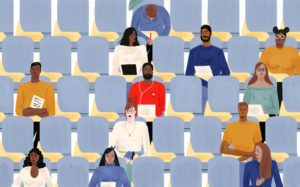NPR/Education
December 16, 2019Fewer Students Are Going To College. Here’s Why That Matter
12.16.19
This fall, there were nearly 250,000 fewer students enrolled in college than a year ago, according to new numbers out Monday from the National Student Clearinghouse Research Center, which tracks college enrollment by student.
“That’s a lot of students that we’re losing,” says Doug Shapiro, who leads the research center at the Clearinghouse.
And this year isn’t the first time this has happened. Over the past eight years, college enrollment nationwide has fallen about 11%. Every sector — public state schools, community colleges, for-profits and private liberal arts schools — has felt the decline, though it has been especially painful for small private colleges, where, in some cases, institutions have been forced to close.
“We’re in a crisis right now, and it’s a complicated one,” says Angel Pérez, who oversees enrollment at Trinity College, a small liberal arts school in Hartford, Conn.
Why is this happening?
- The biggest factor for the years of decline is the strong economy. The last time U.S. college enrollment went up was 2011, at the tail end of the recession. As the economy gets better, unemployment goes down — it’s currently at 3.5 % — and more people leave college, or postpone it, and head to work.
- When the recession hit a decade ago, the reverse happened: Many people, especially older adults, returned to college. That bump in college enrollment set records, and in some ways the current downturn is simply “colleges returning to more historic levels of enrollment,” Shapiro says.
- U.S. demographics are also shifting. The number of high school graduates is flat — and in some cases declining — because of lower birth rates about 20 years ago. Those numbers are also projected to decline, so the trend of fewer students coming from high school isn’t going away anytime soon.
- And finally, there’s the cost of college. States are putting less money into higher education, and that’s led to an increased reliance on tuition. As tuition goes up, and grants and scholarships don’t keep pace, that’s pushed the cost of college down to students and their families. Without state investment, institutions are strapped, and so are American families.
BoiseDev
Airline quietly adds service from Boise airport to top eastern city #BoiseDev
Starting July 6th, 2020, Delta will offer a daily roundtrip between the City of Trees and the world’s busiest airport. Atlanta is Delta’s primary hub, and connects to more than 300 destinations.
BoiseDev members get stories like this, fresh in their inbox each day before the public. Sign up now to support our independent journalism.
Daily service from Boise to Atlanta will depart each day at 12:40pm MT, and arrive in Georgia at 6:55pm ET. Service from Atlanta to Boise will depart at 9:40am ET and arrive in Idaho at 12:05pm MT.
PBS/Journalism Deserts
The danger of losing local news.
Over the last 15 years, local newspapers across the U.S. have lost more than $35 billion in advertising revenue and half of their staffs, while at least 2,000 news outlets have shuttered during that time, according to a new study by the non-profit PEN America. Viktorya Vilk, who co-authored the report, joins Hari Sreenivasan to discuss how the decline of local news is impacting civic engagement.



